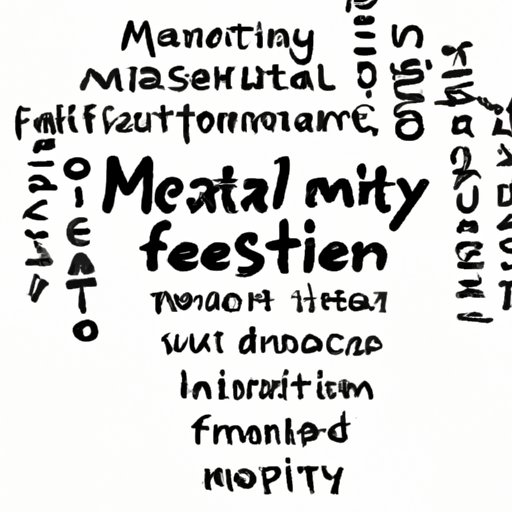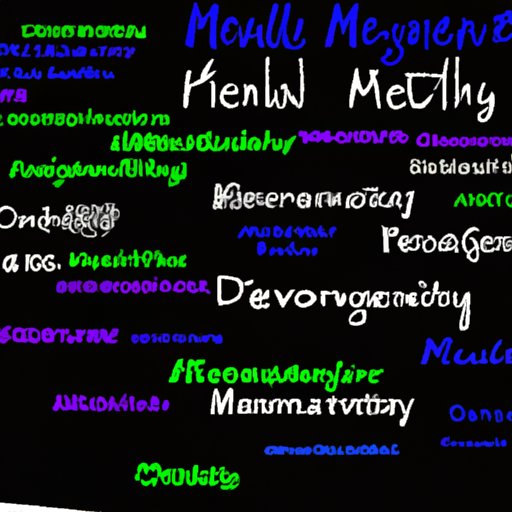Introduction
Mental health is an important part of overall health and well-being. It is the emotional and psychological state of a person’s mind, which affects how they think, feel, and behave in daily life. Each year, the month of May is dedicated to raising awareness about mental health, also known as National Mental Health Month. This year’s theme is “Tools 2 Thrive”, which encourages individuals to take actionable steps towards improving their mental health.

Highlighting Mental Health Resources Available In Your Community
When it comes to mental health, it’s important to know that you are not alone. There are many organizations and resources available in your local community that can provide support and guidance. Some of these include:
Local Support Groups
Support groups are a great way to connect with others who may be going through similar experiences. These groups offer a safe space to share stories, ask questions, and receive advice from those who have been there before. Many communities offer support groups specifically for mental health issues such as depression, anxiety, and trauma.
Mental Health Hotlines
If you or someone you know is in crisis and needs immediate help, mental health hotlines are available 24 hours a day, seven days a week. These hotlines provide free and confidential support from trained professionals. You can call any time to speak with someone who can provide advice and resources.
Online Resources
In addition to local support groups and hotlines, there are many online resources available for those looking for more information about mental health. Websites such as Mental Health America and NAMI offer comprehensive information about mental health conditions, treatments, and resources in your area. There are also online forums and chat rooms where you can connect with other people who are struggling with similar issues.
Exploring the Signs and Symptoms of Mental Illness
Mental illness can affect anyone at any age, so it’s important to be aware of the signs and symptoms. While everyone experiences mental health differently, there are some common signs that may indicate a need for help.
Signs of Depression
Depression is one of the most common mental illnesses. Some common signs of depression include feeling hopeless or helpless, having low energy, difficulty concentrating, changes in appetite or sleeping patterns, and thoughts of suicide or self-harm. If you or someone you know is experiencing any of these symptoms, it is important to seek help from a mental health professional.
Symptoms of Anxiety
Anxiety is another common mental illness. Signs of anxiety include persistent worries or fears, avoidance of certain situations, physical symptoms such as racing heart and sweating, and difficulty sleeping. If you or someone you know is exhibiting these symptoms, it is important to seek help from a mental health professional.
Warning Signs of Suicide
Suicide is a serious issue that should not be taken lightly. Warning signs of suicide include talking about wanting to die, expressing feelings of hopelessness or worthlessness, withdrawing from friends and family, and engaging in risky behaviors. If you or someone you know is exhibiting any of these warning signs, it is important to seek help from a mental health professional immediately.

Examining the Impact Mental Illness Has On Families
Mental illness can have a significant impact on a family. It can cause stress and tension between family members, lead to strained relationships, and make communication difficult. It is important to remember that all family members are affected by mental illness, and that everyone needs support to cope with the situation. Here are some ways to manage the impact mental illness has on families:
Effects on Relationships
The effects of mental illness can take a toll on relationships within a family. It is important to maintain open and honest communication, as well as understand each other’s needs and perspectives. It is also important to set boundaries and establish healthy coping mechanisms to ensure everyone is getting the support they need.
Challenges with Communication
Communication can be difficult when dealing with mental illness. It is important to be patient and understanding of each other’s feelings and opinions. It is also important to listen without judgment and be willing to compromise.
Strategies for Coping
It is important to take care of yourself and practice self-care when dealing with mental illness. This includes making time for activities that make you happy, such as exercising, meditating, or spending time with friends and family. It is also important to reach out for help if needed. Talking to a therapist or joining a support group can be beneficial in managing the stress and emotions associated with mental illness.

Interviewing Mental Health Professionals About Coping Strategies
Talking to a mental health professional is a great way to learn more about mental health and develop effective coping strategies. Mental health professionals can provide valuable insight into various types of treatments and therapies, such as cognitive behavioral therapy, dialectical behavior therapy, and medication management. Here are some of the most common treatments and therapies used to manage mental illness:
Cognitive Behavioral Therapy
Cognitive behavioral therapy (CBT) is a type of talk therapy that helps people identify and change negative thought patterns and behaviors. CBT focuses on helping people gain insight into their thoughts and feelings, and teaches them skills to better manage their emotions and reactions.
Dialectical Behavior Therapy
Dialectical behavior therapy (DBT) is a type of talk therapy that helps people develop healthier coping skills and better manage emotions. DBT focuses on understanding the relationship between thoughts, feelings, and behaviors, and teaches skills such as mindfulness, distress tolerance, and emotion regulation.
Medication Management
Medication management is the use of prescription medications to treat mental health conditions. Medications can be used to reduce symptoms, such as anxiety and depression, and to stabilize mood. It is important to discuss all options with a mental health professional before starting any new medications.
Focusing on How to Create a Supportive Environment for Mental Health
Creating a supportive environment for mental health is an important step in managing mental illness. It is important to focus on reducing stress, encouraging self-care, and building a support network. Here are some tips for creating a supportive environment for mental health:
Reducing Stress
Stress can have a negative impact on mental health, so it is important to find ways to reduce stress. This can include setting aside time for relaxation, practicing deep breathing and meditation, and participating in activities that bring joy.
Encouraging Self-Care
Self-care is an essential part of managing mental health. It is important to make time for activities that make you feel good, such as exercising, reading, or spending time outdoors. It is also important to take breaks when needed and avoid burnout.
Building a Support Network
Having a strong support system is key to managing mental health. This can include friends and family, as well as mental health professionals, such as therapists and psychiatrists. It is important to build a network of individuals who can provide support and understanding during difficult times.
Writing About the Benefits of Seeking Treatment for Mental Health Issues
Seeking treatment for mental health issues is an important step in managing mental illness. While it can be difficult to take the first step, it is important to remember that treatment can lead to improved quality of life, increased self-esteem, and increased coping skills. Here are some of the benefits of seeking treatment for mental health issues:
Improved Quality of Life
Treatment for mental health issues can lead to improved quality of life. It can help reduce symptoms, increase functioning, and improve overall wellbeing.
Increased Self-Esteem
Treatment can help increase self-esteem by teaching skills to better manage emotions and reactions. It can also help individuals gain insight into their thoughts and behaviors, leading to increased self-awareness and confidence.
Increased Coping Skills
Treatment can help increase coping skills, such as problem-solving and stress management. This can lead to improved emotional regulation and increased resilience in difficult situations.
Conclusion
May is National Mental Health Month, and it is an important time to raise awareness and encourage individuals to take actionable steps towards improving their mental health. There are many resources available in your local community, such as support groups, mental health hotlines, and online resources. It is important to be aware of the signs and symptoms of mental illness, as well as the impact it can have on families. Mental health professionals can provide insight into various types of treatments and therapies, and it is important to focus on creating a supportive environment for mental health. Finally, seeking treatment for mental health issues can lead to improved quality of life, increased self-esteem, and increased coping skills. Everyone deserves to get the help and support they need for their mental health, so please don’t hesitate to seek help if needed.
(Note: Is this article not meeting your expectations? Do you have knowledge or insights to share? Unlock new opportunities and expand your reach by joining our authors team. Click Registration to join us and share your expertise with our readers.)
